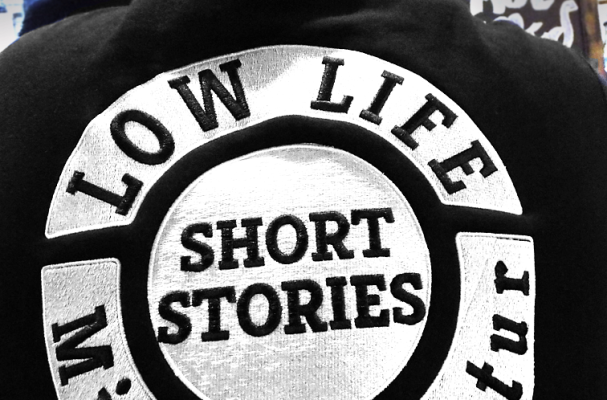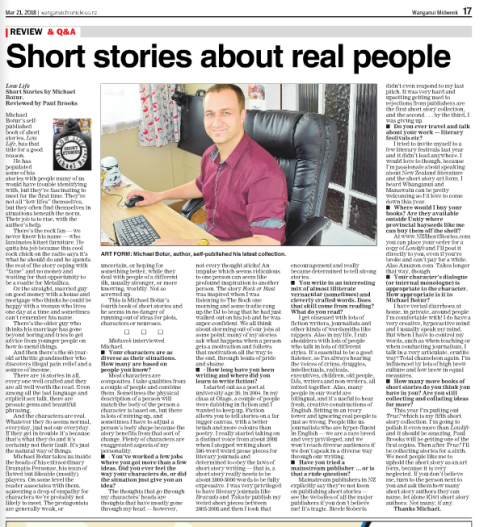‘Lowlife’ short story collection reviewed in Wanganui Midweek by ed. Paul Brooks

Michael Botur’s book of short stories, Low Life, has that title for a good reason. He has populated some of his stories with people many of us would have trouble identifying with, but they’re fascinating to meet for the first time. They’re not all “low lifes” themselves, but they often find themselves in situations beneath the norm. Their job is to rise, with the author’s help.
Wanganui Midweek Lowlife review
There’s the rock fan — we never know his name — who laminates kitset furniture. He quits his job because this cool rock chick on the radio says it’s what he should do and he spends the rest of the story coping with “fame” and no money and waiting for that opportunity to be a roadie for Metallica.
Or the straight, married guy on good money with a house and mortgage who thinks he could be happy with a woman who lives one day at a time and sometimes can’t remember his name.
There’s the older guy who thinks his marriage has gone beyond boring and tries to get advice from younger people on how to mend things.
And then there’s the 60-year-old arthritic grandmother who discovers illegal pain relief and a source of income.
The stories are well worth the read and they’re well crafted. Even amongst all the bad language and explicit sex talk, there are prosaic gems and beautiful phrasing.
And the characters are real. Whatever they do seems normal, everyday, just not our everyday. If they get in trouble it’s because that’s what they do and it’s certainly not their fault. It’s just the natural way of things.
Michael Botur takes us inside the heads of his extraordinary Dramatis Personae, his team of flawed but likeable (mostly) players. On some level the reader associates with them, squeezing a drop of empathy for characters we’re probably not likely to meet. The protagonists are generally weak, or uncertain, or hoping for something better, while they deal with people of a different ilk, usually stronger, or more knowing, worldly. Not so screwed up.
This is Michael Botur’s fourth book of short stories and he seems in no danger of running out of ideas for plots, characters or neuroses.
Your characters are as diverse as the situations in which they find themselves. How many are based on people you know?
Most characters are composites. I take qualities from a couple of people and combine them. Sometimes the physical description of a person will match the body of the person a character is based on, but there is lots of mixing-up, and sometimes I have to adjust a person’s body shape because the story benefits from that sort of change. Plenty of characters are exaggerated aspects of my personality.
You’ve worked a few jobs where you have said you got more than a few ideas. Did you ever feel the way your characters do, or did the situation just give you an idea?
The thoughts that go through my characters’ heads are thoughts that have mostly gone through my head – however, not every thought sticks! An impulse which seems ridiculous to one person can seem like profound inspiration to another person. The story ‘Rock or Bust’ was inspired when I was listening to The Rock one morning and some tradie rang up the DJ to brag that he had just walked out on his job and he was super-confident. We all think about storming out of our jobs at some point; many of my stories ask what happens when a person gets a motivation and follows that motivation all the way to the end, through bouts of pride and shame.
How long have you been writing and where did you learn to write fiction as well as you do?
I started out as a poet at university age 20, in 2004. In my class, at Otago, a couple of people were dabbling in fiction and I wanted to keep up. Fiction allows you to tell stories on a far bigger canvas, with a better brush and more colours than poetry. I really started taking on a distinct voice from about 2008 when I stopped writing short 500 word weird prose pieces for literary journals and determined to obey the laws of short story writing – that is, a short story really needs to be about 2000-5000 words to be fully expressive. I was very privileged to have literary journals like Bravado and Takahe publish my weird short pieces between 2005-2008 and then I took that encouragement and really became determined to tell strong stories.
You write in an interesting mix of almost illiterate vernacular (sometimes) and cleverly crafted words. That’s some skill – does it come from reading, and what do you read?
I get obsessed with lots of fiction writers, journalists and other kinds of wordsmiths like rappers. Also in my life, I rub shoulders with lots of people who talk in lots of different styles. It’s essential to be a good listener, so I’m always hearing the voices of crims, druggies, intellectuals, radicals, executives, children, old people, DJs, writers and non-writers, all mixed together. Also, many people in our world are bilingual, and it’s useful to hear fresh, creative constructions of English. Sitting in an ivory tower and ignoring real people is just so wrong. People like us journalists who are hyper-fluent in English, we are a rare breed and very privileged, and we won’t reach diverse audiences if we don’t speak in a diverse way through our writing.
Have you tried a mainstream publisher for your work … or is that a rude question?
Mainstream publishers in NZ explicitly say they’re not keen on publishing short stories – see the websites of all the major publishers if you don’t believe me! It’s tragic. Steele Roberts didn’t even respond to my last pitch. It was very hard and upsetting getting used to rejections from publishers are the first short story collection, and the second… by the third, I was giving up.
Do you ever travel and talk about your work – i.e. literary festivals etc?
I tried to invite myself to a few literary festivals last year and it didn’t lead anywhere. I would love to, though, because I’m passionate about speaking about the NZ literature and the short story art form. I heard Whanganui and Manawatu can be pretty welcoming so I’d love to come down this year.
Where would I buy your books? Are they available outside Unity where provincial hayseeds like me can buy them off the shelf?
At http://www.NZShortStories.com you can place your order for a copy of Lowlife and I’ll post it directly to you, even if you’re broke and can’t pay for a while. Also Amazon.com. Takes longer that way, though.
Your character’s dialogue (or internal monologue) is appropriate to the character. How appropriate is it to Michael Botur?
I have verbal diarrhoea at home, in private, around people I’m comfortable with! I do have a very creative, hyperactive mind and I usually speak my mind. But when I have to control my words, such as when teaching or when conducting journalism, I talk in a very articulate, erudite way! Total chameleon again. I’m influenced by lots of high brow culture and low brow in equal measures.
How many more books of short stories do you think you have in you? In other words, are you still collecting and collating ideas for more?
This year I’m putting out ‘True?’ which is my fifth SS collection. I’m going to polish it even more than Lowlife and it should be amazing. Paul Brooks will be getting one of the first copies. Then after ‘True?’ I’ll be collecting stories for a sixth. We need people like me to uphold the short story as an art form, because it is very neglected. If you don’t believe me, turn to the person next to you and ask them how many short story authors they can name, let alone KIWI short story authors. Not many, if any.
- http://www.nzherald.co.nz/wanganui-chronicle/midweek/news/article.cfm?c_id=1503658&objectid=12018194
- http://www.nzherald.co.nz/nz/news/article.cfm?c_id=1&objectid=12018194

Leave a Reply